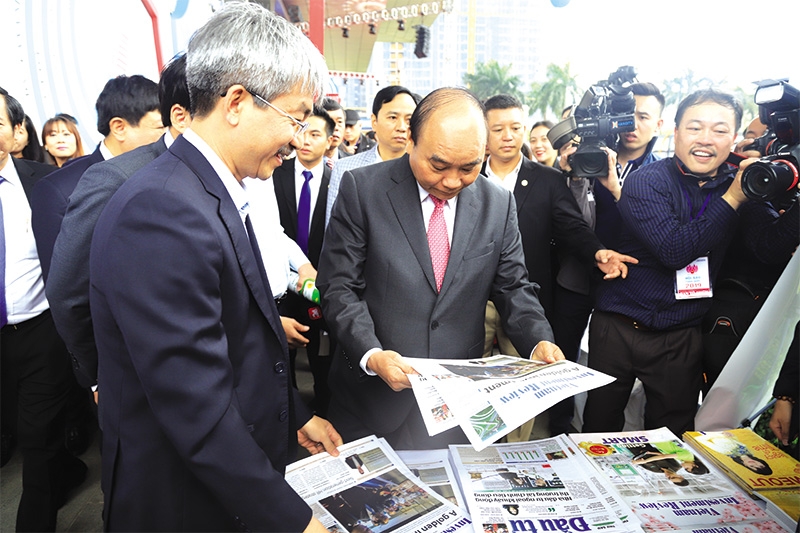Leaders take note of valuable press
 |
| Prime Minister Nguyen Xuan Phuc visited VIR’s booth at the National Press Festival in in Hanoi in March |
Prime Minister Nguyen Xuan Phuc last week asked government agencies to seek solutions to solve the various issues in the sectors of tourism, infrastructure, human resources, and the digital economy. His move followed the reading of articles which highlighted issues that are still affecting the development of the business community, and the public. In fact, the media has played an important part in the work of the prime minister. It has helped him make many decisions to solve various issues happening in ministries, localities, and enterprises.
The media is also one of the official information channels for the government for conducting its socio-economic monitoring. The media has been acknowledged by the Vietnamese government as a critical tool showcasing the views of businesses on various issues, including the implementation of policies and guidelines, thus helping improve state management.
At the opening ceremony of the National Press Festival in Hanoi in March, PM Phuc stated that the Party and the state always value the role of the press, which is “the key official information channel and a large forum for the public.”
According to the prime minister, Industry 4.0 and rapid ICT development are greatly impacting all sectors of the Vietnamese economy and society. New trends in the media such as direct contact and IT personalisation are strongly changing the way the media operates. Technologies regarding storage and transmission of sound and images, and multimedia models, will continue developing vehemently.
He asked the media to focus on featuring information on the economy and society in line with policies and regulations of the Party and the state.
“The press needs to attach great importance to featuring good sides and bright examples in society in order to create confidence and optimism in it, helping to boost national construction and protection,” PM Phuc stated, adding that the media continues highlighting its responsibility in fighting corruption, wastefulness, and other negative issues.
“Each journalist must possess a firm political stance and professionalism, with strong ethics throughout their career,” he stressed.
The media has also played an important part in the government’s supervision over the operations of many state-owned enterprises (SOEs), contributing to the government’s adjustment of policies and acceleration of equitisation and restructuring of SOEs. In the National Assembly, many deputies have also used news articles as part of their policy proposals to the legislature and the government.
The media has also featured pro-business voices, which has contributed to creating a more business-friendly climate. This is in line with the government’s efforts to support the business community in a bid to further enhance the economic growth and the nation’s international prestige as a whole.
For example, several years ago, eight local dairy goods importers, producers, and traders had a lucky escape when the General Department of Customs of Vietnam (GDCV) handed down a sentence on tax arrears totalling an estimated VND700 billion ($30.43 million). The companies involved were FrieslandCampina, Vinamilk, Nutifood, Hanoimilk, Dai Tan Viet, The He Moi, Hoang Lam, and A Chau. Asked to pay extra value-added tax and import tariffs for material imports which had been miscategorised and therefore under-taxed, these companies asked for media help, saying that the GDCV’s decision was unfounded. Many newspaper outlets published articles on the dairy importers’ appeal to government bodies, which created a wave of public discontent over the department’s decision. As a result, the Ministry of Finance halted the tax collection proposed by the GDCV, which not only helped dairy companies escape the tax arrears toll, but also aided them in avoiding a force-majeure price hike due to increasing operating costs.
In recent years, the European Chamber of Commerce in Vietnam (EuroCham) has issued an annual Whitebook, usually hundreds of pages thick, which covers the chamber’s policy proposals to the Vietnamese government, ministries, and agencies in a bid to help Vietnam improve its business and investment climate.
One of the notable things is that to make such proposals, EuroCham has sourced varying information not only from its hundreds of member companies, but also from other sources including is the media. EuroCham, along with many other domestic and foreign business associations, said they have frequently read and sought information from publications such as VIR before making policies, creating regulations for their member companies, and offering proposals to the local authorised agencies.
What the stars mean:
★ Poor ★ ★ Promising ★★★ Good ★★★★ Very good ★★★★★ Exceptional
Related Contents
Latest News
More News
- Congratulations from VFF Central Committee's int’l partners to 14th National Party Congress (January 25, 2026 | 09:46)
- List of newly-elected members of 14th Political Bureau announced (January 23, 2026 | 16:27)
- 14th Party Central Committee unanimously elects To Lam as General Secretary (January 23, 2026 | 16:22)
- List of members of 14th Party Central Committee announced (January 23, 2026 | 09:12)
- Highlights of fourth working day of 14th National Party Congress (January 23, 2026 | 09:06)
- Press provides timely, accurate coverage of 14th National Party Congress (January 22, 2026 | 09:49)
- Press release on second working day of 14th National Party Congress (January 22, 2026 | 09:19)
- Minister sets out key directions to promote intrinsic strength of Vietnamese culture (January 22, 2026 | 09:16)
- 14th National Party Congress: Renewed momentum for OVs to contribute to homeland (January 21, 2026 | 09:49)
- Party Congress building momentum for a new era of national growth (January 20, 2026 | 15:00)

 Tag:
Tag:




















 Mobile Version
Mobile Version